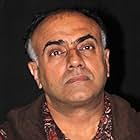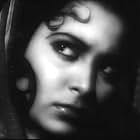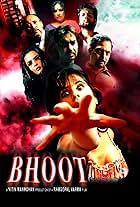An ordinary man is struggling with the onset of Alzheimer's. His daughter fights to save her father from a descent into dementia, and to tries to understand the strange guilt that haunts him... Read allAn ordinary man is struggling with the onset of Alzheimer's. His daughter fights to save her father from a descent into dementia, and to tries to understand the strange guilt that haunts him - that he is responsible for Gandhi's death.An ordinary man is struggling with the onset of Alzheimer's. His daughter fights to save her father from a descent into dementia, and to tries to understand the strange guilt that haunts him - that he is responsible for Gandhi's death.
- Director
- Writers
- Stars
- Awards
- 3 wins & 5 nominations total
Photos
- Director
- Writers
- All cast & crew
- Production, box office & more at IMDbPro
Featured reviews
In "Maine Gandhi Ko Nahin Mara", Jahnu Barua has presented a different subject -- Alzheimer's and possibly the associated dementia -- which is itself a deviation from the trashy theme-of-the-decade stuff turned out by Bollywood.
Barua has shown how at least some doctors (usually the young guys fresh out of med school) will try experimental, unproven and risky therapies, while going against the mainstream. Also, the universal tendency among medical personnel, especially the mental health community, to 'keep the status quo' until SOME result is obtained, be it positive or negative, good or bad for the patient, has been very well-documented.
While it may be true that the late-onset dementia was triggered by long-suppressed childhood memories based on some incident related to Gandhi, the 'Speechifying' at the end was totally unnecessary. The court drama could've been edited for greater effect.
Both Anupam and Urmila come across as somewhat high-strung and a tad one dimensional. The professor is retired but has absolutely no neighbors, friends or colleagues that drop in or visit once in awhile. That is highly unlikely even in modern urban India.
Anupam Kher produced this movie (that is also a trend nowadays), as the fine folks at NFDC either turned down Barua's request for financing or were too busy cavorting at Cannes.
Somewhat slow-paced at times, it is nonetheless a well-made drama about human relationships. 7 out of 10.
Barua has shown how at least some doctors (usually the young guys fresh out of med school) will try experimental, unproven and risky therapies, while going against the mainstream. Also, the universal tendency among medical personnel, especially the mental health community, to 'keep the status quo' until SOME result is obtained, be it positive or negative, good or bad for the patient, has been very well-documented.
While it may be true that the late-onset dementia was triggered by long-suppressed childhood memories based on some incident related to Gandhi, the 'Speechifying' at the end was totally unnecessary. The court drama could've been edited for greater effect.
Both Anupam and Urmila come across as somewhat high-strung and a tad one dimensional. The professor is retired but has absolutely no neighbors, friends or colleagues that drop in or visit once in awhile. That is highly unlikely even in modern urban India.
Anupam Kher produced this movie (that is also a trend nowadays), as the fine folks at NFDC either turned down Barua's request for financing or were too busy cavorting at Cannes.
Somewhat slow-paced at times, it is nonetheless a well-made drama about human relationships. 7 out of 10.
I like the films of Jahnu Barua. I find him to be an honest filmmaker. He has made some very interesting movies--the best of which I consider to be "Papori," made in 1986. Any director would like to aspire to make a bigger budget film, with bigger names in Indian cinema. I guess this was the genesis of Barua's well-meaning effort called "Maine Gandhi Ko Nahin Mara." Forget the melodrama of a senior member of the family suffering from a serious disease (why do so many Indian films need to have this ingredient in the plot?) the viewer will be able to see the honest Barua at work: the modern India forgetful of the values of individuals who gave birth to the world's largest surviving democracy, the dishonest lover who is scared of annoying his parents, the university students who treat a demented teacher with respect and courtesy, and the love and affection of grown-up adults for their parents. These are social values that exist in India today that Yash Chopra and other producers bank on to make a film successful. These are the "feel good" social credentials of Indian cinema.
In this film, the real Jahnu stands up as he succeeds in extracting a marvelous controlled performance from Urmila Matondkar, while Anupam Kher does his usual over-the-top melodrama playing to the gallery as he did in "Saaransh." Yet Jahnu, who usually is careful with his script mixes up Alzheimer's disease (first half of the movie) with delusion and psychological after-effects of a childhood incident (later half of the film) and the cure for it. I am not a medical expert but the two disorders seem to be strange bedfellows to manifest itself in the same individual.
The film, though well-intentioned, lacks the intensity of "Papori" comparatively a small budget film because it plays to the gallery. We love this film because it is more honest than the Bollywood kitsch and has some fine performances. This was evident at its screening at the recent Dubai Film Festival. For many in the audience it was the first film of Barua they had seen. And they liked it. If you loved this film (which is technically superior to his previous films, thanks to the bigger budget) do see Barua's "Papori" or even the less impressive "Aparoopa" where the real talent of Jahnu Barua emerges and impresses you even more.
In this film, the real Jahnu stands up as he succeeds in extracting a marvelous controlled performance from Urmila Matondkar, while Anupam Kher does his usual over-the-top melodrama playing to the gallery as he did in "Saaransh." Yet Jahnu, who usually is careful with his script mixes up Alzheimer's disease (first half of the movie) with delusion and psychological after-effects of a childhood incident (later half of the film) and the cure for it. I am not a medical expert but the two disorders seem to be strange bedfellows to manifest itself in the same individual.
The film, though well-intentioned, lacks the intensity of "Papori" comparatively a small budget film because it plays to the gallery. We love this film because it is more honest than the Bollywood kitsch and has some fine performances. This was evident at its screening at the recent Dubai Film Festival. For many in the audience it was the first film of Barua they had seen. And they liked it. If you loved this film (which is technically superior to his previous films, thanks to the bigger budget) do see Barua's "Papori" or even the less impressive "Aparoopa" where the real talent of Jahnu Barua emerges and impresses you even more.
Once an English film director was reported expressing surprise why so many Bollywood films come out every year and almost none of them carries a story except filmy romance and skin-show. Here is the answer- Maine Gandhi Ko Nahin Mara, a film by renowned director Jahnu Barua. With Anupam Kher and Urmila's superb acting and Barua's excellent direction the film deserves to be a must see. Bollywood industry should produce much more films of this kind instead of its tradition of producing rubbish films. Direction: 10/10; Acting- Anupam Kher: 10/10, Urmila: 9/10; Story: 9/10; Photography: 10/10; Dialogue: 9/10; Music(Background): 10/10.
This is Uttam Chaudhry's (played by Anupam Kher) home. An acclaimed scholar of Hindi and now a retired professor, Chaudhry is a man of principles and values. Professor Chaudhry suffers from frequent bouts of forgetfulness. What looked like a case of absent-mindedness before appears to be turning into a serious illness.He forgets that he has retired, and reaches college only to discover it's a chemistry lecture. He has a hard time coming to terms with the fact that it has been one and a half years since he lost his dear wife. He loses it altogether when Trisha's potential father-in-law places an ashtray and used teacup on a newspaper issue, which has Mahatma Gandhi's photograph. The professor's condition completely deteriorates and he starts blaming himself for being the man accidentally responsible for Gandhi's assassination. So what is his condition? Alzheimer's? Dementia? Schizophrenia? Scientific definitions offered are plenty, but the root cause of this sickness is much more deep-rooted than it appears. That's what makes Maine Gandhi Ko Nahin Mara such a superbly multilayered presentation
When I say disappointment, I mean by Jahnu Barua's standard, and not by Bollywood 'standard', if there is any such thing as standard in Bollywood! Undoubtedly, by the yardsticks of Bollywood, Jahnua Barua's "Maine Gandhi Ko Nahin Mara" is a masterpiece, but....
...by Jahnu Barua's standard, this movie is sub par. Jahnu Barua had won awards in Fribourg, Locarno and other places for his movies, he had been one of the pioneers of serious cinema in Assam (after Dr. Bhabendra Nath Saikia,and also, to some extent, Padum Barua, Deuti Duwara and a handful of others) probably the best known Assamese name to the moviegoers outside Assam (after Bhupen Hazarika and maybe, just maybe, Begum Parbeen Sultana); he showed that someone like Indra Bania, otherwise known only as a comedic actor, could deliver serious performance, he has used the talents of Bishnu Kharghoria, the best Assamese actor of all time (in my subjective opinion), in all his movies, he used theater personalities such as Dulal Roy, and has made many Assamese persons think (and to appreciate serious movies).
Of course, the pitfall of making serious movies in a society plagued by cheap Bombay formula movies is that Jahnua Barua had real problems arranging even Rs. 15 Lakhs (that is, Rs. 1.5 Million, or equivalent of USD 35,000), the minimum amount he needed to make a movie in Assamese. I read this in an interview, where he said that, he would give up making movies in Assamese, as it was too much waste of his time and effort to keep struggling to arrange the money. I also read a letter to the editor by someone in Guwahati, who said that when he arrived to watch a Jahnu Barua movie, the manager of the cinema hall declined to run it, not because he was an idiot, but because even after 30 minutes of the scheduled time, there were only 2 (yes, two!) patrons at the box office!
And as a result, someone as dedicated as Jahnu Barua has to make a movie in Hindi in Bollywood style, where a retired college professor gets to live in a huge mansion (in Bombay, of all places!), and the movie has to end with an absurd courtroom drama!
I do not mean that this is a bad movie; this is not. This movie is yards above the usual Bollywood stuff, 99% of which is stolen from Hollywood (and now also European Cinema: a case in point being Bheja Fry). This movie contains the same sincerity of Barua, that made his movies in Assamese excellent. But this movie does not belong to Jahnu Barua; it was obviously handicapped by the terms of the producers, who made it have some of the tell-tale elements of Bollywood escapism.
So, in a nut-shell, between mutation of the Assamese brain and Bollywood, Jahnu Barua is the casualty.
...by Jahnu Barua's standard, this movie is sub par. Jahnu Barua had won awards in Fribourg, Locarno and other places for his movies, he had been one of the pioneers of serious cinema in Assam (after Dr. Bhabendra Nath Saikia,and also, to some extent, Padum Barua, Deuti Duwara and a handful of others) probably the best known Assamese name to the moviegoers outside Assam (after Bhupen Hazarika and maybe, just maybe, Begum Parbeen Sultana); he showed that someone like Indra Bania, otherwise known only as a comedic actor, could deliver serious performance, he has used the talents of Bishnu Kharghoria, the best Assamese actor of all time (in my subjective opinion), in all his movies, he used theater personalities such as Dulal Roy, and has made many Assamese persons think (and to appreciate serious movies).
Of course, the pitfall of making serious movies in a society plagued by cheap Bombay formula movies is that Jahnua Barua had real problems arranging even Rs. 15 Lakhs (that is, Rs. 1.5 Million, or equivalent of USD 35,000), the minimum amount he needed to make a movie in Assamese. I read this in an interview, where he said that, he would give up making movies in Assamese, as it was too much waste of his time and effort to keep struggling to arrange the money. I also read a letter to the editor by someone in Guwahati, who said that when he arrived to watch a Jahnu Barua movie, the manager of the cinema hall declined to run it, not because he was an idiot, but because even after 30 minutes of the scheduled time, there were only 2 (yes, two!) patrons at the box office!
And as a result, someone as dedicated as Jahnu Barua has to make a movie in Hindi in Bollywood style, where a retired college professor gets to live in a huge mansion (in Bombay, of all places!), and the movie has to end with an absurd courtroom drama!
I do not mean that this is a bad movie; this is not. This movie is yards above the usual Bollywood stuff, 99% of which is stolen from Hollywood (and now also European Cinema: a case in point being Bheja Fry). This movie contains the same sincerity of Barua, that made his movies in Assamese excellent. But this movie does not belong to Jahnu Barua; it was obviously handicapped by the terms of the producers, who made it have some of the tell-tale elements of Bollywood escapism.
So, in a nut-shell, between mutation of the Assamese brain and Bollywood, Jahnu Barua is the casualty.
Did you know
- TriviaThe film caused Anil Kapoor and Anupam Kher's relationship to go sour. Anil Kapoor had intended on casting Anupam Kher in his film "Gandhi My Father" as Mahatma Gandhi. Anupam agreed to the film, then started his own film "Maine Gandhi Ko Nahin Maara". This angered Anil as he thought Anupam was playing the role of Gandhi in the film and he did not inform Anil he was going to make a film on Gandhi. Anupam reasoned that he was not playing Gandhi in his home production, but it was too late. Anil felt betrayed by Anupam.
Details
- Release date
- Country of origin
- Language
- Also known as
- I Did Not Kill Gandhi
- Filming locations
- Production companies
- See more company credits at IMDbPro
- Runtime1 hour 40 minutes
- Color
Contribute to this page
Suggest an edit or add missing content

Top Gap
By what name was Maine Gandhi Ko Nahin Mara (2005) officially released in Canada in English?
Answer
























